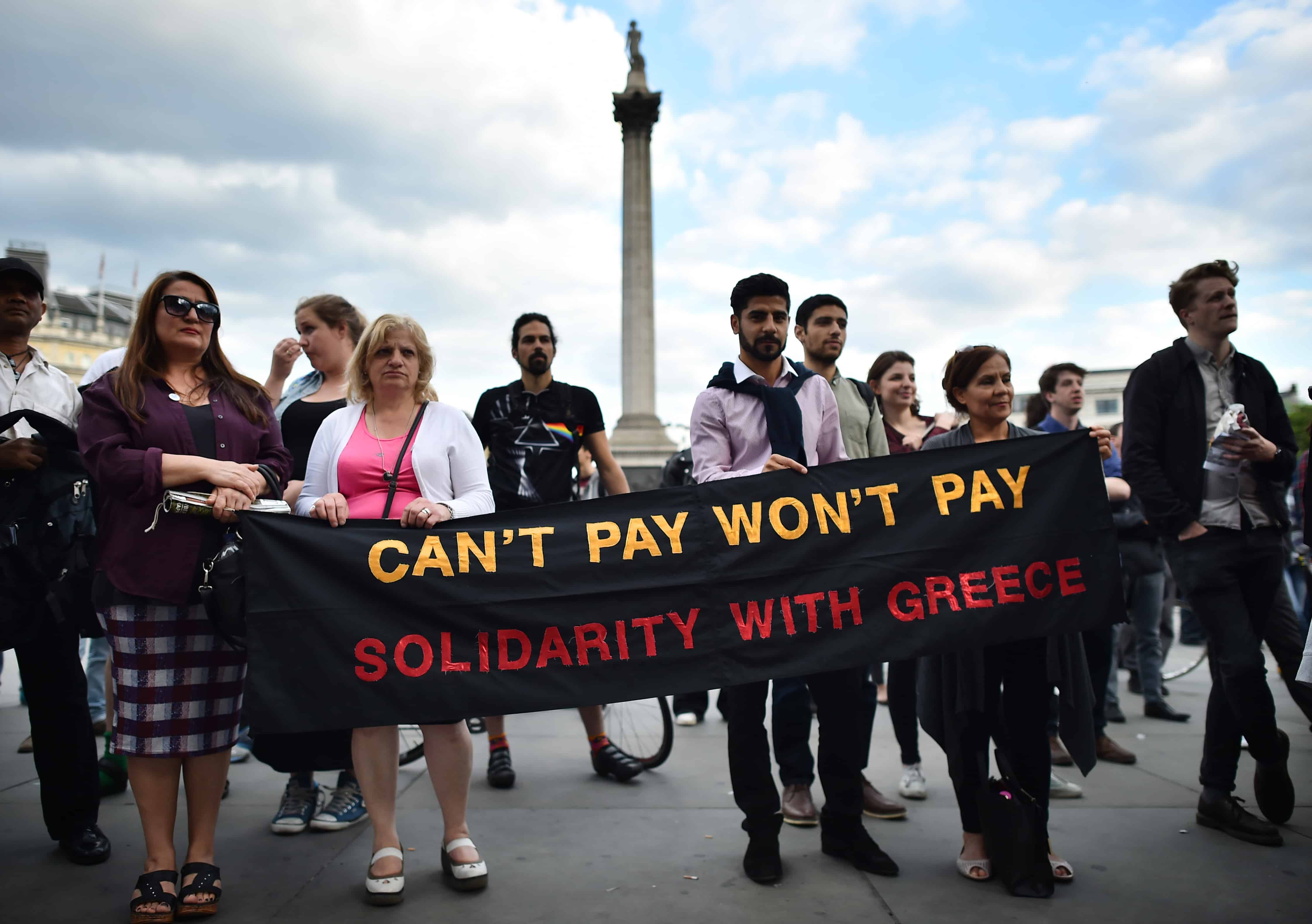WASHINGTON, D.C. — History repeats itself, first as tragedy, then as farce, and finally as trolling. That, at least, is the case in Greece, where its lenders want it to cut its pensions rather than hike its business taxes, because they’re afraid those increases would, as the Financial Times’ Peter Spiegel reports, “crimp economic growth.”
Oh, so now they’re worried that austerity hurts the economy. Too bad they weren’t a little more concerned about that before it made Greece’s economy shrink 25 percent.
Now, the latest Greek drama isn’t over, but it is in its last act. A deal should — admittedly one of the more dangerous words in the English language — be imminent. The problem, as it has been for the past five years, is that Europe and Greece haven’t been able to agree on what austerity the latter will do in return for money from the former. This time, Europe has wanted Greece to cut its pensions more than the 40 percent they already have, but Greece hasn’t. And that was that. Both sides thought the other would cave the closer they got to the deadline, so there was a lot of talk about “red lines” and “final offers” but not much actual negotiation.
That’s changed now. Why? Well, Greece has discovered it has much less leverage than it thought. Part of it is that panic about Greece has stayed in Greece because the European Central Bank has both begun to buy other countries’ bonds and promised to buy as many as it takes to keep their borrowing costs down. And the rest is that Greece’s banks aren’t so much an Achilles heel as an Achilles whole. In other words, they’re pretty easy to pressure. Greece’s banks not only need emergency loans from the ECB to stay afloat, but are also sitting on a pile of Greek government bonds and deferred tax assets that would presumably be worth a lot less if there isn’t a deal and Athens defaults.
So all Europe has to do is say it isn’t sure Greece’s banks have enough cash to stay open, and people will pull their money out even faster than before. That’s what happened when European officials leaked that they weren’t sure Greece’s banks could make it past Monday, and followed it up by saying they might have to stop people from moving their money out of the country. That’s yelling run in a crowded bank. And it worked. Greek depositors pulled out three times as much as normal the past few days, and that’s left their banks even more at the mercy of the ECB — which has forced the government to either leave the euro or accept Europe’s terms.
Greece gave in. Well, mostly. It’s proposing to cut its pensions about half as much as Europe wants — raising contributions and retirement ages, as well as cutting back on early retirement — and then raising taxes to make up for the rest. Specifically, it would levy a new tax on corporate profits and increase its value-added tax, basically a national sales tax, to 23 percent on all but a handful of items. In all, this would be a fiscal tightening of 1.5 percent of gross domestic product this year and 2.9 percent the next.

The only thing holding up a deal is that Europe thinks this is the wrong kind of austerity. Spending cuts don’t seem to be as bad for the economy as tax hikes, so that’s what Europe wants Greece to do. On the one hand, this is sound economic advice. But on the other, are you freaking kidding me? It’s like making someone commit suicide, and then disapproving of how they did it . The real question is why Europe is forcing Greece to do any more austerity at all. It’s already done so much that, before this latest showdown, it actually had a budget surplus before interest payments. And that’s all it should shoot for, really: the point at which it doesn’t need any more bailouts from Europe. Anything more than that, though, would just inflict unnecessary — and self-defeating! — harm to the economy. When interest rates are zero, as they are now, budget cuts of 3 percent of GDP would, by The New York Times’ Paul Krugman’s calculation, make the economy shrink something like 7.5 percent. So even though you have less debt, your debt burden isn’t much better since you have less money to pay it back.
There’s only one reason to make Greece do more austerity, and it makes no sense at all. That’s to try to make it pay back what it owes. Indeed, one European official said that the entire point of this was that they “want to get our money back some day.” The problem, though, is everybody knows Greece will never do that. Its debt should have been written down in 2010, but it wasn’t because it was “bailed out” to the extent that it was given money to then give to French and German banks. The longer Europe pretends this new debt will be paid back, the longer Greece’s depression will go on. Now, it’s true that Europe has lowered the interest rates and extended the maturities on Greece’s debt so far out that, for now at least, it’s like a lot of it doesn’t exist. But eventually it will, and at that point they’ll either need to extend-and-pretend some more or hope that Greece has returned to growth.
Until then, Greece will be stuck in its economic Groundhog Day. It keeps trying to resist these pointless budget cuts that just keep it in a perpetual state of high unemployment, but then gives in at the last minute. On second thought, history is just repeating itself as tragedy over and over again.
O’Brien is a reporter for Wonkblog covering economic affairs. He was previously a senior associate editor at The Atlantic.
© 2015, The Washington Post






